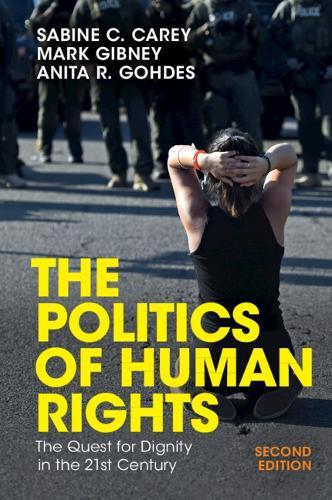Overview
Accessible and engaging, The Politics of Human Rights offers a fresh, empirical approach to understanding human dignity and the global responsibility to protect it. Unlike traditional texts, this textbook moves beyond theory, using data-driven insights to explore why human rights violations occur and how they can be prevented. It emphasizes shared responsibility across borders to uphold human rights. Designed for students and educators, this fully updated edition enhances learning with discussion questions, recommended readings, and a unique collection of films, podcasts, and websites that bring human rights issues to life. It provides a well-rounded perspective, grounded in latest social scientific research, for anyone interested in human rights. Whether used for introductory courses or interdisciplinary studies, this book equips readers with the knowledge and tools to critically engage with human rights issues, making it an essential resource for understanding and advocating for human dignity in the twenty-first century.
Full Product Details
Author: Sabine C. Carey (University of Mannheim) ,
Mark Gibney (University of North Carolina, Asheville) ,
Anita R. Gohdes (Hertie School of Governance, Berlin)
Publisher: Cambridge University Press
Imprint: Cambridge University Press
Edition: 2nd Revised edition
Weight: 0.470kg
ISBN: 9781009537896
ISBN 10: 100953789
Pages: 324
Publication Date: 06 November 2025
Audience:
General/trade
,
General
Format: Paperback
Publisher's Status: Active
Availability: Manufactured on demand

We will order this item for you from a manufactured on demand supplier.
Reviews
'The Politics of Human Rights offers an insightful and empirically grounded exploration of human rights, their violations, and the mechanisms designed to protect them. This revised edition integrates rigorous scientific analysis with real-world case studies, making it an invaluable resource for students, scholars, and practitioners. With its focus on the universal nature of human rights and the shared responsibility to uphold them, this book is an essential guide for understanding both the challenges and the progress in the fight for human dignity.' Bonny Ibhawoh, Senator William McMaster Chair in Global Human Rights, McMaster University 'This is an excellent introduction to the politics of human rights and what we know from existing research. It provides a framework to help readers understand how challenges to human rights arise, highlighting the specific actors and their choices, as well the scope for efforts to improve human rights.' Kristian Skrede Gleditsch, Regius Professor of Political Science, University of Essex & Research Associate, Peace Research Institute Oslo 'This book is a must-read primer on human rights, perfect for undergraduate courses, graduate seminars, as a comprehensive guide for scholars moving into studying human rights, and as a reference tool for scholars already studying human rights or repression. It expansively covers essential topics – the legal definitions of human rights, data collection on human rights violations, the causes of human rights violations, and the prevention of, and societal recovery from, human rights violations – but does so accessibly and with a myriad of engaging examples. The book also smartly engages a variety of critical contemporary issues, including the human rights of migrants, corporations and organized crime as human rights violators, police violence in the US in a human rights context, and many others. The chapter on human rights and the Internet is an incredible and compelling synthesis of a diverse set of sub-fields.' Jennifer Earl, Chair and Professor, Department of Sociology and Criminal Justice, University of Delaware
‘The Politics of Human Rights offers an insightful and empirically grounded exploration of human rights, their violations, and the mechanisms designed to protect them. This revised edition integrates rigorous scientific analysis with real-world case studies, making it an invaluable resource for students, scholars, and practitioners. With its focus on the universal nature of human rights and the shared responsibility to uphold them, this book is an essential guide for understanding both the challenges and the progress in the fight for human dignity.' Bonny Ibhawoh, Senator William McMaster Chair in Global Human Rights, McMaster University ‘This is an excellent introduction to the politics of human rights and what we know from existing research. It provides a framework to help readers understand how challenges to human rights arise, highlighting the specific actors and their choices, as well the scope for efforts to improve human rights.' Kristian Skrede Gleditsch, Regius Professor of Political Science, University of Essex & Research Associate, Peace Research Institute Oslo ‘This book is a must-read primer on human rights, perfect for undergraduate courses, graduate seminars, as a comprehensive guide for scholars moving into studying human rights, and as a reference tool for scholars already studying human rights or repression. It expansively covers essential topics – the legal definitions of human rights, data collection on human rights violations, the causes of human rights violations, and the prevention of, and societal recovery from, human rights violations – but does so accessibly and with a myriad of engaging examples. The book also smartly engages a variety of critical contemporary issues, including the human rights of migrants, corporations and organized crime as human rights violators, police violence in the US in a human rights context, and many others. The chapter on human rights and the Internet is an incredible and compelling synthesis of a diverse set of sub-fields.' Jennifer Earl, Chair and Professor, Department of Sociology and Criminal Justice, University of Delaware
Author Information
Sabine C. Carey is Chair of Political Science, International Relations at the University of Mannheim. Mark Gibney is Belk Distinguished Professor at the University of North Carolina, Asheville. Anita R. Gohdes is Professor of International and Cyber Security at the Hertie School of Governance in Berlin.



